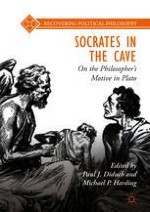2019 | OriginalPaper | Buchkapitel
11. Plato’s Euthyphro on Divine and Human Wisdom
verfasst von : Wayne Ambler
Erschienen in: Socrates in the Cave
Aktivieren Sie unsere intelligente Suche, um passende Fachinhalte oder Patente zu finden.
Wählen Sie Textabschnitte aus um mit Künstlicher Intelligenz passenden Patente zu finden. powered by
Markieren Sie Textabschnitte, um KI-gestützt weitere passende Inhalte zu finden. powered by
